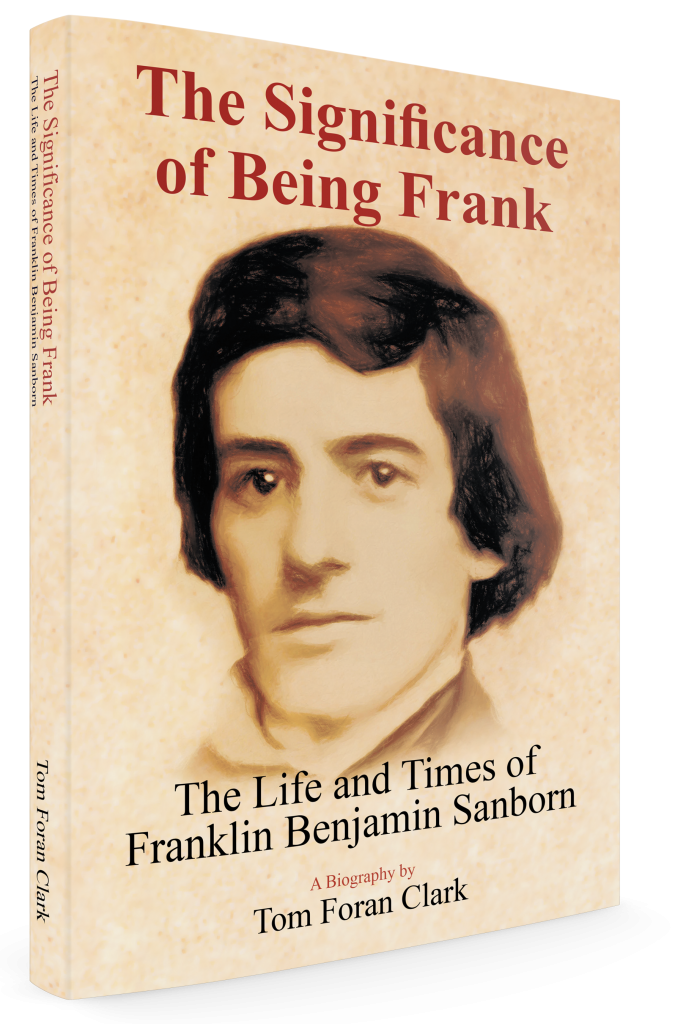
Book Overview
Franklin Benjamin Sanborn was born December 15, 1831 in Hampton Falls, New Hampshire. In 1850, Sanborn studied Greek with a private tutor, then entered Phillips Exeter Academy and, after, entered Harvard, from which he graduated in 1855. Sanborn moved to Concord, Massachusetts, where he taught school.
Active in politics as a member of the Free Soil Party in New Hampshire and Massachusetts, in 1856 Sanborn became Secretary of the Massachusetts Kansas Commission, where he came into contact with John Brown. Sanborn was one of “The Secret Six,” who knew in advance of Brown’s impending raid on Harper’s Ferry in October, 1859.
On the night of April 3, 1860, five federal marshals from Virginia arrived at Sanborn’s Concord home, handcuffed him, and attempted to wrestle him into a waiting coach in order to take him to Washington, D.C. to answer questions before the Senate regarding his entanglements with John Brown. Some 150 townspeople rushed to his defense. Louisa May Alcott wrote a friend, “Sanborn was nearly kidnapped. Great ferment in town. Annie Whiting immortalized herself by getting into the kidnapper’s carriage so that they could not put the long legged martyr in.” Though Sanborn would disavow his having had any advance knowledge of John Brown’s attack, he would defend Brown’s actions to the end of his life, assisting in the support of his widow and children and making periodic pilgrimages in later years to John Brown’s grave. He would not only write a biography of John Brown, but also of Ralph Waldo Emerson, Henry David Thoreau, Samuel Gridley Howe, and others.
From 1863 to 1867 Sanborn was editor of the Boston Commonwealth, from 1867 to 1897 editor of the Journal of Social Science, and from 1868 to 1914 a correspondent of the Springfield Republican. He was associated with the National Conference of Charities, the National Prison Association, the Massachusetts Infant Asylum, and the Clarke School for the Deaf. In 1863, he became Secretary of the Massachusetts State Board of Charities. He was Secretary from 1863 to 1868 and again from 1874 to 1876. In 1865, he was one of the founders of the American Social Science Association and was its Secretary from 1865 to 1897. In 1879 he became State Inspector of Massachusetts Charities under a new board and helped reorganize the entire Charities system, focusing especially on the care of children and insane persons. He served as Chairman until 1888.
Sanborn was twice married. In 1854, he married Ariana Walker, who died just eight days later. Sanborn courted the nineteen-year-old daughter of Ralph Waldo Emerson, Edith Emerson, proposing to her in 1861. He was rejected. In 1862, Sanborn married his cousin Louisa Leavitt, who had worked as a schoolteacher at the Concord school Sanborn had founded. They would have three sons.
In the end, Sanborn was revered as a relic from a golden age gone by – “a tall and venerable figure moving picturesquely through Boston and Concord.” He died on February 24, 1917, after being struck by a railway baggage cart during a visit to his son Francis in New Jersey. He was buried at the Sleepy Hollow Cemetery in Concord, near the graves of his friends and mentors Ralph Waldo Emerson, Bronson Alcott, Ellery Channing, and Henry Thoreau. Concord’s flags were flown at half-mast for three days. At the end of the month, February, 1917, just prior to America’s entering World War I, the Massachusetts House of Representatives recognized Sanborn’s “dedication to the unfortunate, the diseased, and the despised.”
Reviews
“The Significance of Being Frank is a rare biographical gem. Sanborn is little known to our generation but we have author Clark to thank for changing that. This elegant and evidently well-researched portrait of Sanborn gives us insight into the abolitionist, publisher, and educator who was at Concord with Thoreau and Emerson and was confidential advisor to John Brown. Highly recommended.” – Kenneth Lanxner, Editor of Lives: The Biography Resource
“I have just finished reading ‘The Significance of Being Frank.’ It is related, annotated, and anatomized with a skill that compels not only a reader’s constant admiration but, what is perhaps more remarkable, his constant attention. The reader is swept along in a torrent of enthusiasm. Indeed, the whole book is a model of what a biography should be – clear in its reasoning, judicious and calm, orderly in its marshaling of facts, rightly disdainful of purely imaginative reconstruction, and always brilliantly alive in both narrative and discussion. Sanborn deserves his memoir. This is a singularly remarkable accomplishment.” – A. J. Anderson, Editor of Lin Yutang: The Best of an Old Friend
“Not only is this undeservedly marginalized figure brought to life in this compelling work, but the intimate details of Clark’s narrative brings Sanborn’s Transcendentalist world to life as well. This remarkable biography produces for the reader a direct sense of the social nerve and intellectual daring of 19th Century New England. Clark has done an outstanding job in the art of biography. Easy to navigate, well researched, a must read for anyone seriously interested in U.S. History and American Transcendental Philosophy and Literature.” – Danne Polk, The Philosophy Research Base, ErraticImpact.com

